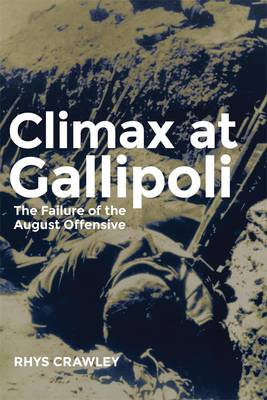
- Retrait gratuit dans votre magasin Club
- 7.000.000 titres dans notre catalogue
- Payer en toute sécurité
- Toujours un magasin près de chez vous
- Retrait gratuit dans votre magasin Club
- 7.000.0000 titres dans notre catalogue
- Payer en toute sécurité
- Toujours un magasin près de chez vous
Description
Gallipoli: the mere name summons the story of this well-known campaign of the First World War. And the story of Gallipoli, where in August 1915 the Allied forces made their last valiant effort against the Turks, is one of infamous might-have-beens. If only the Allies had held out a little longer, pushed a little harder, had better luck--Gallipoli might have been the decisive triumph that knocked the Ottoman Empire out of the First World War. But the story is just that, author Rhys Crawley tells us: a story. Not only was the outcome at Gallipoli not close, but the operation was flawed from the start, and an inevitable failure.
A painstaking effort to set the historical record straight, Climax at Gallipoli examines the performance of the Allies' Mediterranean Expeditionary Force from the beginning of the Gallipoli Campaign to the bitter end. Crawley reminds us that in 1915, the second year of the war, the Allies were still trying to adapt to a new form of warfare, with static defense replacing the maneuver and offensive strategies of earlier British doctrine. In the attempt both the MEF at Gallipoli and the British Expeditionary Force on the Western Front aimed for too much--and both failed. To explain why, Crawley focuses on the operational level of war in the campaign, scrutinizing planning, command, mobility, fire support, interservice cooperation, and logistics. His work draws on unprecedented research into the files of military organizations across the United Kingdom and Australia.
The result is a view of the Gallipoli Campaign unique in its detail and scope, as well as in its conclusions--a book that looks past myth and distortion to the facts, and the truth, of what happened at this critical juncture in twentieth-century history.
Spécifications
Parties prenantes
- Auteur(s) :
- Editeur:
Contenu
- Nombre de pages :
- 384
- Langue:
- Anglais
- Collection :
- Tome:
- n° 42
Caractéristiques
- EAN:
- 9780806152066
- Date de parution :
- 24-06-15
- Format:
- Livre broché
- Format numérique:
- Trade paperback (VS)
- Dimensions :
- 152 mm x 226 mm
- Poids :
- 544 g

Les avis
Nous publions uniquement les avis qui respectent les conditions requises. Consultez nos conditions pour les avis.






